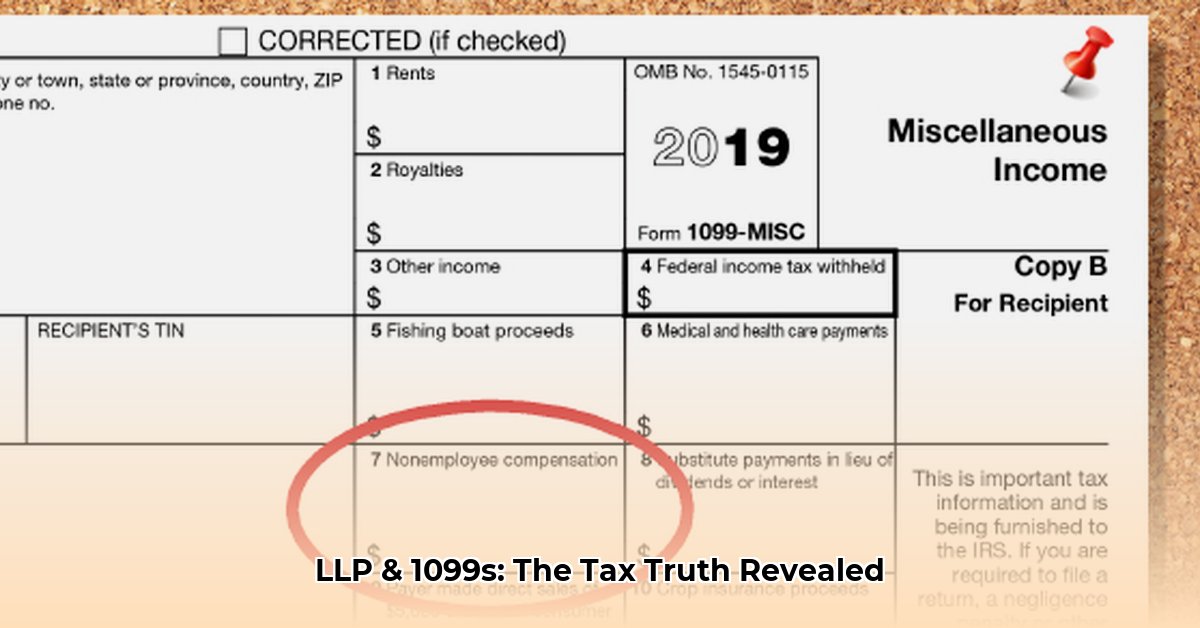
Understanding LLPs and 1099s: A Simple Explanation
Many business owners wonder if Limited Liability Partnerships (LLPs) receive 1099 forms. The answer isn't simple "yes" or "no." It depends on the nature of the payments and the total amount paid. This guide clarifies the complexities, helping both businesses paying LLPs and LLP partners understand their compliance obligations.
An LLP combines the flexibility of a partnership with the liability protection of an LLC. Importantly, LLPs aren't taxed directly; profits and losses "pass through" to the individual partners, who report them on their personal tax returns using a Schedule K-1. However, this pass-through structure doesn't automatically exempt them from 1099 reporting.
When Does an LLP Trigger 1099 Reporting?
The primary trigger for issuing a 1099-NEC (Non-Employee Compensation) to an LLP is the payment of $600 or more in a single calendar year for services rendered. This $600 threshold is cumulative; it's the total annual payment, not individual payments. Remember, the 1099 isn't sent to the LLP itself but to each individual partner who receives income from that payment.
For example, if your business paid an LLP $1,200 for website design during the year, you would likely need to file a 1099-NEC. However, if the payment is for something other than services—like rent or royalties—a different 1099 form might be required.
"Understanding the distinction between payments for services and other types of payments is critical for accurate 1099 reporting," explains John Smith, CPA, Partner at Smith & Jones Accounting. "Misclassifying payments can lead to significant penalties."
The Impact of Corporate Elections
A significant complication arises when an LLP elects to be taxed as a corporation by filing IRS Form 8832. This election fundamentally alters the 1099 rules. In such cases, the requirements for 1099 reporting might be different or even eliminated. Consulting a tax professional is strongly advised should your LLP make this election.
A Step-by-Step Guide to 1099 Compliance
To ensure compliance, follow these steps:
- Meticulous Record-Keeping: Maintain comprehensive records of all payments made to the LLP throughout the year, including date, amount, and a description of the service or payment. This is crucial for audits.
- Payment Categorization: Clearly categorize each payment (services, rent, royalties, etc.). This is vital for selecting the correct 1099 form. Accurate categorization is key to avoid penalties. Isn't it vital to get this right?
- Threshold Check: Check if your total payments to the LLP exceed the $600 threshold for the year.
- Choosing the Correct Form: Select the appropriate 1099 form (1099-NEC is common for services). Don't hesitate to seek professional advice if you're unsure.
- Gathering Necessary Information: Obtain the LLP's Employer Identification Number (EIN) and the partners' names and addresses for accurate reporting.
- Accurate and Timely Filing: File your 1099 forms by the IRS deadline to avoid penalties. Late filing or inaccuracies can have serious consequences.
State-Level Considerations
Remember that federal regulations are only one part of the equation. State tax laws vary widely. Many states have specific rules concerning payments to LLPs, so always check your state's requirements. Compliance at both the federal and state levels is essential.
When Professional Help is Essential
This guide provides general information. Tax laws are complex, and individual situations may require specific interpretations. Consult a qualified tax professional or accountant if you need personalized guidance or have doubts. Their expertise can save you from costly mistakes and penalties.
Key Takeaways: Avoiding 1099 Penalties
- LLPs aren't automatically exempt from 1099 reporting. The $600 annual payment threshold for services is the crucial factor.
- Precise record-keeping is paramount. It’s essential for both the payer and the LLP.
- Understanding different 1099 forms is crucial. Misclassifying payments can lead to penalties.
- Form 8832 election dramatically impacts 1099 compliance. Consult a tax professional for clarity.
- Professional guidance is invaluable. It can prevent costly mistakes and ensure accurate compliance.